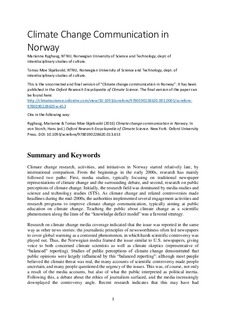| dc.description.abstract | Climate change research, activities, and initiatives in Norway started relatively late, by international comparison. From the beginnings in the early 2000s, research has mainly followed two paths: First, media studies, typically focusing on traditional newspaper representations of climate change and the surrounding debate, and second, research on public perceptions of climate change. Initially, the research field was dominated by media studies and science and technology studies (STS). As climate change and related controversies made headlines during the mid-2000s, the authorities implemented several engagement activities and research programs to improve climate change communication, typically aiming at public education on climate change. Teaching the public about climate change as a scientific phenomenon along the lines of the “knowledge deficit model” was a favored strategy.
Research on climate change media coverage indicated that the issue was reported in the same way as other news stories: the journalistic principles of newsworthiness often led newspapers to cover global warming as a contested phenomenon, in which harsh scientific controversy was played out. Thus, the Norwegian media framed the issue similar to U.S. newspapers, giving voice to both concerned climate scientists as well as climate skeptics (representative of “balanced” reporting). Studies of public perceptions of climate change demonstrated that public opinions were largely influenced by this “balanced reporting”: although most people believed the climate threat was real, the many accounts of scientific controversy made people uncertain, and many people questioned the urgency of the issues. This was, of course, not only a result of the media accounts, but also of what the public interpreted as political inertia. Following this, a debate about the ethics of journalism surfaced, and the media increasingly downplayed the controversy angle. Recent research indicates that this may have had paradoxical consequences; downplaying controversy has made climate change less newsworthy, and it has thus been given less priority by Norwegian media.
Recently, more disciplinary groups have become interested in climate change communication, from psychology to linguistics, political science, and philosophy. Accordingly, research trajectories have multiplied, and at least two new strands surfaced: how science is communicated in traditional and new social media and the use of climate change knowledge in so-called “climate change services.” The latter strand of research typically also relates to climate change adaptation work, to a greater extent than the earlier works, where the focus has mainly been on mitigation. | nb_NO |
